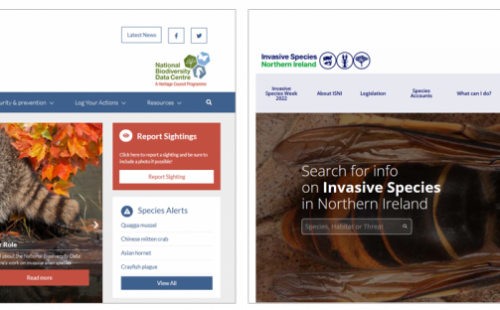The National Biodiversity Data Centre and Northern Ireland Environment Agency jointly launch two new invasive species websites during Invasive Species Week 2022.

About Invasive Alien Species:
Invasive alien species are animals, plants or pathogens that do not naturally occur in Ireland but are here because of human activity. These species are recognised as one of the key drivers of biodiversity loss. Preventing the introduction of new invasive species while also limiting the spread and impacts of those already established is fundamental to protecting Ireland’s biodiversity.
Most alien (also known as non-native) species do not cause any harm and only a small proportion are considered to be invasive. These species can be introduced intentionally for many reasons such as planting in gardens, or to keep as pets but they may then disperse or escape. They may be intentionally released to the wild for hunting or food, although this is illegal. Invasive alien species can also arrive here accidently as hitchhikers on our vehicles, belongings or as contaminants on products. There is an increasing trend of introduction of invasive alien species to Ireland, a trend seen globally that is linked to increased movements of people, goods and increased connectivity of our trade networks. The economic costs associated with invasive species are often substantial, eradication control and management programmes, measures introduced to limit spread and impacts, restoring damaged ecosystems and loss or disruption to the provision of invasive species good and services. Since the 17th century invasive species have contributed to nearly 40% of all animal extinctions for which the cause is known.
Both websites are now live, and users will find useful resources and information on invasive alien species, those that are present or widely established in Ireland and Northern Ireland already as well as new arrivals and those that there is concern about arriving here in the near future.
The websites will facilitate information sharing, not just between Ireland and Northern Ireland but across all eight administrations of the British Irish Council (an institution established to provide a forum for consultation and co-operation on key work sectors.
Further Information is available here.

